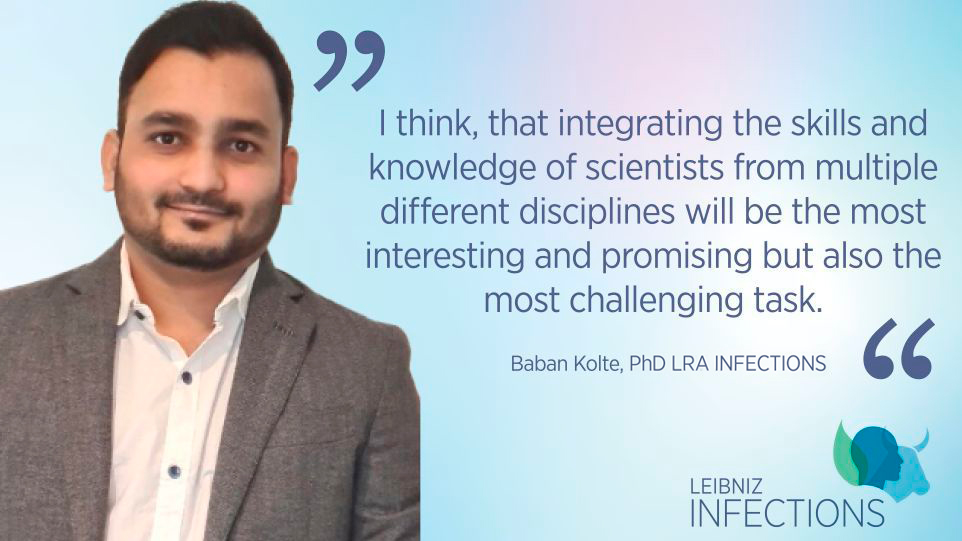From now on, we will introduce one of the six new PhDs of the LRA INFECTIONS every week. For this purpose, the PhD students have answered a few short questions. Today we start with Baban Kolte, Bioinformatician from India.
Baban Kolte is located within the LRA INFECTIONS in the Interdisciplinary Project Team 1 (IPT1) "Central metagenomic, microbiological and spectroscopic analyses". The aim of this project is to quantitatively detect antimicrobial resistant (AMR) bacteria collected within the other IPTs and also to characterize them phenotypically and genomically.
His research serves as a central hub for bioinformatic analysis of sequencing data and spectroscopic identification of AMR bacteria.

Profile Baban Kolte
Name: Baban Kolte
Age: 27
Where and what have you studied?
I am from Maharashtra, India and obtained Master’s degree in Bioinformatics from Savitribai Phule Pune University (SPPU). For my Master’s thesis at the Bioinformatics Centre, SPPU, I developed the database "FilTer BaSe: A web accessible chemical database for small compound libraries". This work was published in the Journal of Molecular Graphics and Modelling. In addition, I spent a year at SPPU's Department of Biotechnology working on projects such as insilico drug discovery, database development for flavonoids and chalcones compounds, and the design of a novel peptide vaccine against the Hepatitis-C virus using both experimental and computational methods. The findings of the research have been published/communicated in peer-reviewed scientific journals.
Prior to starting my PhD at the Leibniz Institute DSMZ, I worked as a 'Bioinformatician' at the Department of Chemistry, University of Hamburg. My work comprised the analysis of next-generation sequencing data and the development of an algorithm to detect small open-reading frames in bacterial genomes that encode small proteins. In 2021, this work has been published in Nucleic Acids Research and PLOS Genetics, respectively.
Which field of research interests you the most?
I have always been interested in genomics and computational drug design. Working in collaboration with experimental biologists and computer scientists to tackle current and evolving biological problems would be of great interest to me as a Bioinformatician.
Why did you apply to the Leibniz Research Alliance INFECTIONS?
I applied to the Leibniz Research Alliance INFECTIONS project because it provides a great opportunity to collaborate with researchers from different backgrounds and it will give me a chance to learn a lot and gain my technical and research skills which will help me in achieving future goals. I am fascinated by the IPT1 project because it is exactly in my field of interest.
Describe your research project briefly and in a generally understandable way:
Thanks to the “INFECTIONS” project, I am currently diving into the fascinating world of antimicrobial resistant pathogens. My project in IPT1 serves as a central hub for bacteriological, molecular biological, and bioinformatics analysis of large-scale genomic and metagenomic sequencing data and spectroscopic identification of AMR bacteria. The objective of this project is to understand the distribution, diversity and spread of AMR.
What do you think will be the biggest challenges but also the biggest opportunities
during your work?
The entire research project is challenging and it will allow me to gain broad skills and knowledge in AMR research. I think, that integrating the skills and knowledge of scientists from multiple different disciplines (e.g. microbiologists, ecologists, entomologists, epidemiologists, veterinarians, social scientists, computer scientists and engineers) will be the most interesting and most promising task, and it will be most challenging at the same time.
Thanks for the interview and great to have you on board!

